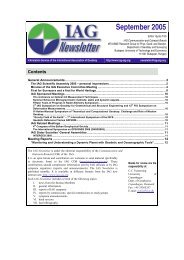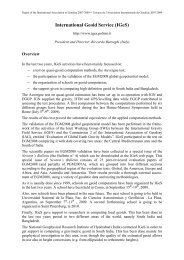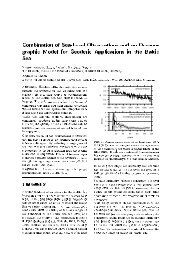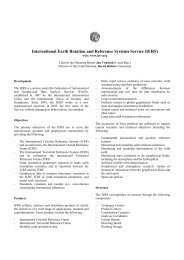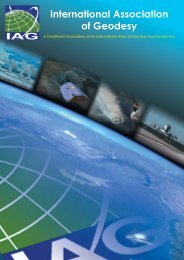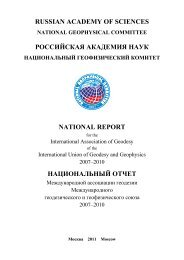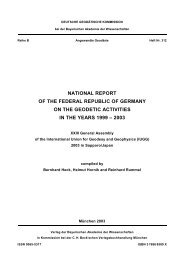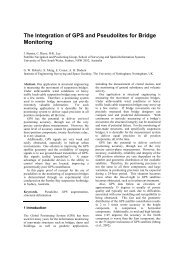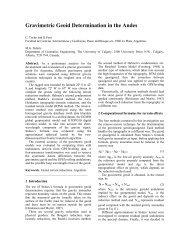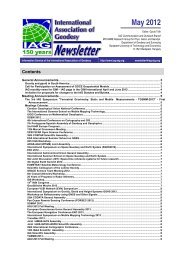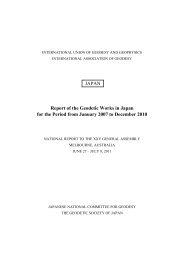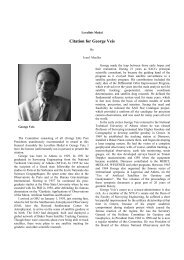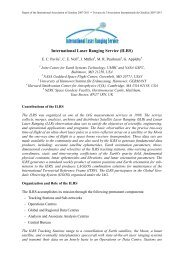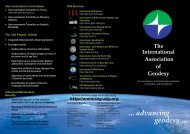Commission 3 â Geodynamics and Earth Rotation
Commission 3 â Geodynamics and Earth Rotation
Commission 3 â Geodynamics and Earth Rotation
- No tags were found...
Create successful ePaper yourself
Turn your PDF publications into a flip-book with our unique Google optimized e-Paper software.
Report of the International Association of Geodesy 2007-2011 ─ Travaux de l’Association Internationale de Géodésie 2007-2011b) Second generation stations – those started during the first GGP campaign (97-03). Almostall of these stations have operated well (CB, MB, MC, ME, BH, MO, NY, <strong>and</strong> SU) withthe data almost up to date. We have no data from Matsushiro (MA), <strong>and</strong> station TigoConcepcion (TC) had some troubles due to the Chile earthquake in 2010. The SG atVienna has been moved to the Conrad Observatory (Austria) <strong>and</strong> was restarted in 2009.c) Third generation stations – newer stations since 2007. Only 3 of these (HS, PE, <strong>and</strong> KA)have sent any appreciable amount of data. MunGyung (MG) stopped in 2010 but wenever received the previous data. We are waiting on data from AP, BF, CO, DJ, WA,WG, <strong>and</strong> GE. We hope by the time of the IUGG (June 2011), that at least some of thesestations will have responded.ICET (Ducarme/Barriot) have been processing <strong>and</strong> correcting 1 minute data covering theperiod 2007/1/1 – present. This is available at the ICET/GFZ site http://ggp.gfz-potsdam.de/5. GGP <strong>and</strong> ICETIn order for GGP to become an IAG service, it was essential that several tasks be organized ina solid <strong>and</strong> responsible manner for the benefit of IAG, <strong>and</strong> particularly GGOS as the umbrellaproject for geodetic <strong>and</strong> gravity data.These tasks were identified by Jentzsch as the st<strong>and</strong>ardization of 1-minute data, the correctionof 1 minute data by ICET, the provision of a calibration history for all the gravimeters withinGGP, <strong>and</strong> the provision of annual tidal analyses of the GGP data by ICET. It was alsorecognized that the SG data flow had peaked in the early 2000s <strong>and</strong> some of the new SGstations were unfamiliar with high precision gravity data <strong>and</strong> their processing. For a numberof reasons, the percentage of SG data being sent to ICET has declined in the last few years,despite the efforts of GGP to assist new groups in sending the data to GFZ. As indicated insection 4, it is the newer stations that (as a group) have sent the least data.GGP data has always been sent directly to GFZ. As indicated above, prior to 2007 otheraspects of the GGP data were h<strong>and</strong>led by ICET. Since 2007, <strong>and</strong> until early 2010, there hadbeen no correction of GGP data by ICET. The automatic program envisaged <strong>and</strong> presented byJ.-P. Barriot in 2007 to do this task has not yet been released to GGP.The raw 1 minute decimated data usually sent to GFZ includes spikes, disturbances <strong>and</strong>offsets, which if left in the data renders it unsuitable for tidal analysis. ROB removed thesedisturbances in a semi-manual way (using TSOFT) <strong>and</strong> put the processed data on the GFZwebsite as ‘corrected 1-minute data’. ICET at ROB provided a regular tidal analysis of allstations using the corrected 1 minute data as a means of checking the quality of each SG <strong>and</strong>site. These reports were presented <strong>and</strong> published at various SG meetings.In 2010 B. Ducarme resumed the responsibility of correcting the GGP data at ICET in thesame manner as prior to 2007. At the 2 nd Asian SG Meeting in Taiwan, the ICET report by B.Ducarme <strong>and</strong> J.-P. Barriot (attached at the end of this report) was presented showing a reportof tidal analysis of stations that had sent data to ICET. This is a valuable task, as it enables alocal tidal model to be used at each station to remove solid <strong>Earth</strong> <strong>and</strong> ocean tides from anydata set.If stations do not send 1 minute data to ICET, then their data will not be corrected by thisprocedure, <strong>and</strong> the tidal analysis cannot be done. Ducarme (personal communication) hasindicated that such analyses will continue at least up to the IUGG meeting in Melbourne (June



